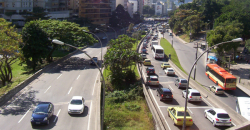
— Traffic congestion is a major problem in the United States, so one California university wants to know if you can decrease traffic by paying drivers.
At a time when the U.S. is trillions of dollars in debt, the U.S. Department of Transportation awarded a $3 million dollar research grant to California's Stanford University for what one Stanford news story described as "cold cash and [a] social game to relieve rush hour traffic."
The project targets peak-hour commuters who usually enter campus between 8 a.m. and 9 a.m. and those who usually leave between 5 p.m. and 6 p.m.
Called Capri (Congestion and Parking Relief Incentives,) the program wants to change the pattern of drivers so they commute the hour before or the hour after peak congestion.
Created by Balaji Prabhakar, a professor of electrical engineering and computer science at Stanford, the program uses cash incentives from $2 to $50 in a "social game" atmosphere where participants can have status symbols such as "member" or "platinum."
Most drivers with a university parking permit can enroll in the project. Once enrolled, drivers receive an ID tag that attaches to the inside of the windshield.
Scanners installed at main campus entry points detect users who avoid the weekday rush.
According to Stanford, the $3 million dollar experiment will soon be extended to include Stanford parking lots.
The Stanford experiment should come as no surprise considering the National Highway Traffic Safety Administration recently experimented with paying people to obey speed limits.




